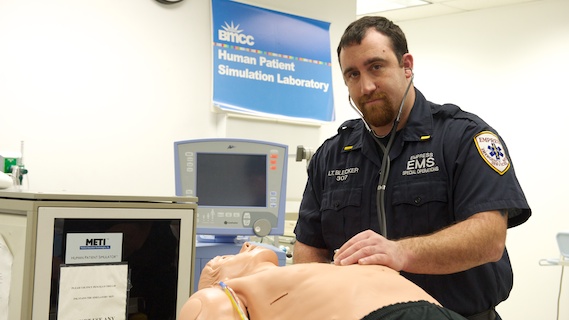
No one wants to experience a medical emergency. But if you do, this is the person you want on your side: BMCC alumnus Michael Blecker, who recently received New York State’s highest honor for paramedics, the 2013 ALS (Advanced Life Support) Provider of the Year award.
Blecker’s nomination for the prestigious award was triggered by his saving the life of a fellow paramedic, who was having a severe allergic reaction to strawberries.
“I was called back to the base, and by the time I got there, her throat had closed,” he says. “She had broken out with hives and couldn’t speak. Within 11 minutes she was intubated, medicated, and she made a full recovery.”
Acting quickly, Blecker applied a risky—and life-saving—emergency procedure called Rapid Sequence Intubation, where the patient is paralyzed through medication and a tube is placed into the trachea.
For that swift response, he was honored at the New York State Vital Signs EMS Conference in Buffalo, last October.
Before that, he was recognized at the Westchester Regional EMS Council’s 40th Annual EMS Awards Ceremony in Sleepy Hollow, New York.
“There are 18 EMS administrative regions,” Blecker explains, “each with its own council. You’re nominated at the regional level, then one of those awardees is selected for the state award.”
A paramedic student during 9/11
Michael Blecker grew up in Athens, Greece, and moved to Brooklyn, New York with his family at age 15. As a teen, he worked in a veterinarian’s office and earned an associate degree in veterinary technology at SUNY Delhi, before attending BMCC.
His exposure to lab procedures, biology and other areas in his veterinary technician classes “gave me an advantage in the paramedic program,” he says.
Also by then, he was working as an EMT—Emergency Medical Technician—at Empress EMS in Yonkers, and his perspective on emergency response deepened with the attacks on the World Trade Center in September 2001.
“I spent three days helping out,” he says. “We slept in Stuyvesant High School, and the Staten Island ferry terminal. We did mostly search and recovery—a lot digging.”
Classes at BMCC resumed by the end of that semester, and in the weeks of heightened awareness after 9/11, he was called out of Professor Gene Ianuzzi’s toxicology lecture, to respond to an emergency.
“There was a mass case of food poisoning in Yonkers,” he said, “and at first we thought it might be a biological emergency. I showed Gene the message on my phone and he said, ‘Go and be safe’. The faculty at BMCC was great. They make the classes interesting, and I’ve kept up with them over the years.”
Professor Iannuzzi is now Director of BMCC’s paramedic program, which “presents a high level of intensity,” he says. “A lot has to be learned in a relatively short period of time. We jokingly tell everyone at the beginning of class, ‘Say goodbye to your family and friends—you’re not going to see them for a year!’”
BMCC, he points out, “was the first accredited paramedic program in the state. We’re doing many more EMT courses than we used to. We’re out in front, as far as getting medics into degree programs.”
Building a career with specialized training
“As a paramedic I have been able to use more skills than I did as an EMT,” says Michael Blecker.
“I have a more comprehensive knowledge base about pharmacology, certain medical interventions, intubation, electric therapy of cardiac rhythms, and cardiology in general,” he says.
In addition, he has earned specialized certifications through the NYS Department of Health and FEMA (the Federal Emergency Management Agency).
This training covers Weapons of Mass Destruction Awareness, Hazardous Materials, the federal Incident Command System, and other areas.
Now working as a Lieutenant in the Special Operations Division at Empress EMS, Blecker is the go-to expert for decontamination, and other specialized responses.
“For example,” he explains, “there might be a construction accident at a site where asbestos is present, or a radiological emergency in a lab.”
He also supervises BMCC paramedic majors as they complete their clinical rotations through “ride alongs” with EMT teams, and he has taught in the paramedic program at the former St. Vincent’s Hospital in Manhattan.
No two days the same
“It’s a great field to be in now,” says Michael Blecker. “I think there’s always a need for paramedics—if you have a good head on your shoulders, and you’re a responsible person.”
The U.S. Bureau of Labor Statistics predicts that between 2012 and 2022, the total number of EMT and paramedic jobs nationwide will increase by 23%, nationwide.
It’s also a line of work in which the skills and protocols evolve constantly.
“The technology and equipment changes,” says Blecker. “Medicine changes. The pre-hospital cardiac monitors have probably advanced the most, since I started in the field.”
Asked to share an exciting story about his day-to-day work, he is at somewhat of a loss.
“Where do I start?” he says. “Each day is different. No two days have been the same. That’s what I love about my career. Things happen when you least expect them to happen.”

